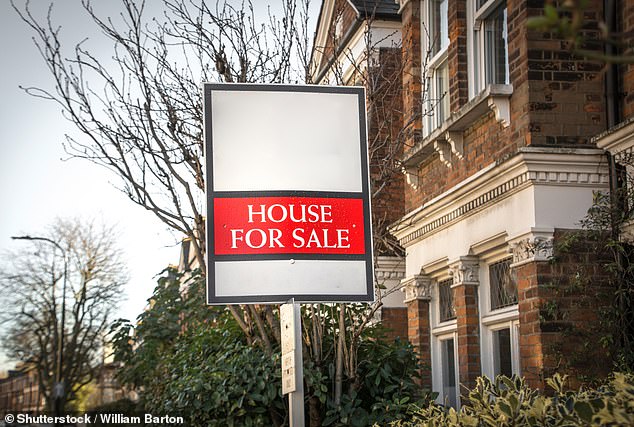Table of Contents
The house price prophet who predicted the last two recessions says prices are still on track to peak in 2026, before crashing again.
Fred Harrison, author and economic commentator, is expecting house prices to continue rising until the end of 2026, before the next big housing crisis hits.
He sticks to this prediction even though there was only modest house price growth this year.
Year on year, Nationwide said house prices rose 3.7 percent, and prices are still 1 percent below the all-time peak recorded in the summer of 2022.
Harrison is famous for his theory of an 18-year business cycle and refuses to accept that the cycle has gone astray, despite black swan events like the pandemic.
“Since the Second World War, the UK – and the global economy – has gone through three economic cycles lasting 18 years,” he told This is Money.
‘These cycles were driven and shaped by a 14-year real estate cycle. This starts with affordable house prices, goes through a mid-cycle house price decline during the ninth year, and then rises to peak house prices at the end of 14 years.
‘Cycles are predictable. They adhere to basic economic theory and I have contrasted it with historical evidence spanning centuries.
“The most recent cycles were on time and ended in 1974, 1992 and 2010. The OECD Real House Price Index has tracked this phenomenon since 1970 and the peaks and valleys are visible for all to see.”
What is the 18-year real estate cycle theory?
The real estate cycle is made up of two main phases, according to Harrison.
After each crisis occurs, it takes about four years for the real estate market to restart its upward trajectory again.
This, he says, is followed by six or seven years of modest growth in what is known as the recovery phase.
Then there is a mid-cycle dip, often a market decline of one or two years, before another growth phase ensues, typically lasting another six or seven years.
Harrison believes the pandemic disrupted the last six or seven years of growth, with house prices seeing double-digit increases in 2021 and 2022.
However, it says prices have now been recalibrated through 2023 and 2024 and will continue to rise.
Fred Harrison developed the concept of the 18-year real estate cycle after mapping hundreds of years of data.
“Real estate agents are talking about house prices going down since 2022,” says Harrison. ‘The reality is that the Covid pandemic disrupted the economy, including the property market.
‘With the end of the pandemic, house prices returned to the 14-year growth path.
‘Falling prices should be treated as a psychological illusion. Prices continue their trajectory forward and upward.’
According to the Harrison cycle, we are now approaching the peak.
“If all goes according to plan, the fourth cycle will end in 2028, and house prices will rise over the next two years until they peak in 2026,” he says.
However, Harrison’s prediction for the next two years comes with a caveat.
“Historical evidence shows that a world war can break the cycle; that’s what happened in the 1930s,” he adds.
‘Will Vladimir Putin decide to drop a nuclear bomb on Ukraine? If so, all bets are off for the UK property market.
How much will house prices rise in 2026?
According to Harrison, a two-year “winner’s curse” often heralds the end of the 14-year real estate cycle.
This is when house prices typically accelerate through double-digit annual increases as people get caught up in “speculative mania.”
However, this time is different, according to Harrison, thanks to the pandemic housing boom.
“We have already accumulated double-digit increases,” he says. ‘Thanks to Covid and the generosity of governments, trillions of dollars, pounds and euros were invested in economies. The real estate market captured much of that money.
Despite the Covid boom, Harrison believes we could see house prices rise by around 15%
‘The traditional mid-cycle slowdown, recorded by weakening house prices, came just in time, in 2019. Then Covid became a threat to people’s health and wealth in the spring of 2020.
“Governments poured in printed money in the summer of 2020 and, voila, the housing market gobbled up that largesse by increasing prices.
“Increases exceeded 10 percent annual growth before the slush fund was depleted…and the real estate cycle returned to normal.”
Despite the Covid surge, Harrison estimates we could see house prices rise by around 15 per cent between now and the end of 2026.
The average house now sells for £292,000 according to ONS data. This would mean it could rise to £335,800 by the end of 2026, an increase of £43,800.
How Trump will drive up UK house prices
Part of the reason for this price increase will be the election of Donald Trump in the United States, according to Harrison.
“Donald Trump’s decision to cut tax rates will be a boon for the US housing market and will raise expectations in much of the rest of the world, including the UK,” he says.
‘This effect in the United States is inevitable: the real estate market automatically captures the benefits of reductions in tax collection.
‘In the UK, house prices will rise steadily. My best estimate is a 15 percent increase.
‘The Starmer government will fail to accelerate housing construction. Then there is the £5 billion the Government says it will invest in agriculture over the next two years, which will drive up prices across the country.
‘But Starmer’s tax on business owners will serve as a brake on the pace of price rises in the UK.
‘And it must be taken into account that the explosive growth in prices was already banked, during the two years of the pandemic episode. The structural needs of the cycle have been covered.’

Winner’s Curse: Harrison believes house prices will rise 15% before peaking in late 2026. But then he expects the market to crash shortly after.
How serious will the accident be?
The latest OBR forecasts suggest that house prices will rise steadily until 2030, without peaking in 2026.
From 2026 to the end of the forecast period, house price growth is expected to be around 2.5 percent annually. Average house prices in 2028 are expected to reach £310,000.
This is a prediction that Harrison flatly refutes.
“If you believe in the OBR, there won’t be a wild recession,” he says. ‘But the 18-year economic cycle is part of the DNA of the economy. So as long as Putin doesn’t do something stupid, house prices will stagnate in 2026.
‘I cannot predict in which quarter the peak will appear. This time, I wouldn’t be surprised if the cycle extends into spring 2027.”
Harrison has no doubt that there will then be a housing crisis, but he won’t speculate (at least not yet) on exactly how bad it will be.
“It depends on a series of global events and how they might interact to amplify the downward climb,” he says.
“I am currently reviewing the historical evidence to get an idea of what lies ahead in 2028. The results will be available in the spring.”
Harrison adds: ‘In 2007, subprime mortgages buried in bank vaults were blamed for the financial crisis. The banks were bailed out because they were “too big to fail.”
‘This time it will be worse, with global headwinds putting pressure on house prices. Debt levels around the world are reaching 100 percent or more of GDP and interest rates are tightening.
‘By the end of 2026, bankrupt governments will be “too big to fail.” But who will rescue them?
Some links in this article may be affiliate links. If you click on them, we may earn a small commission. That helps us fund This Is Money and keep it free to use. We do not write articles to promote products. We do not allow any commercial relationship to affect our editorial independence.

